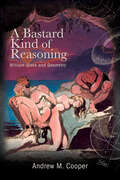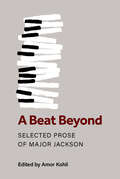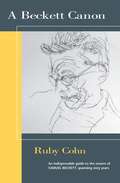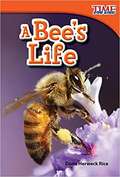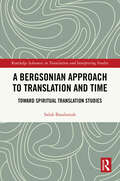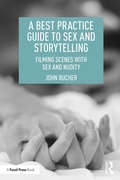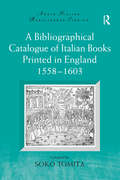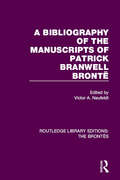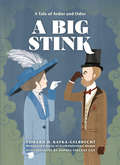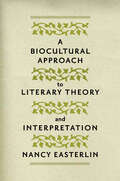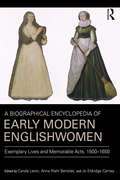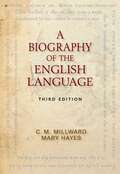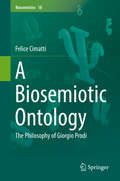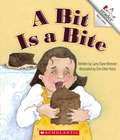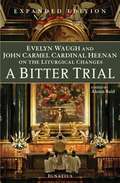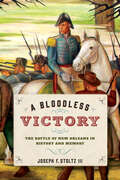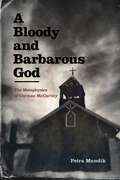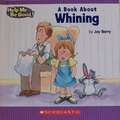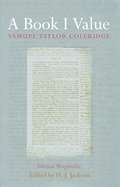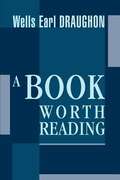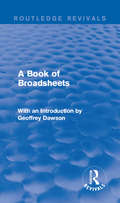- Table View
- List View
A Bastard Kind of Reasoning: William Blake and Geometry (SUNY series, Studies in the Long Nineteenth Century)
by Andrew M. CooperWhat do Einsteinian relativity, eighteenth-century field theory, Neoplatonism, and the overthrow of three-dimensional perspective have in common? The poet and artist William Blake's geometry—the conception of space-time that informs his work across media and genres. In this illuminating, inventive new study, Andrew M. Cooper reveals Blake to be the vehicle of a single imaginative vision in which art, literature, physics, and metaphysics stand united. Romantic-period physics was not, as others have assumed, materialist. Blake's cosmology forms part of his age's deep reevaluation of body and soul, of matter and Heaven, and even probes what it is to understand understanding, reason, and substance. Far from being anti-Newtonian, Blake was prophetically post-Newtonian. His poetry and art realized the revolutionary potential of Enlightened natural philosophy even as that philosophy still needed an Einstein for its physics to snap fully into focus. Blake's mythmaking exploits the imaginative reach of formal abstractions to generate a model of how sensation imparts physical extension to the world. More striking still, Cooper shows how Blake's art of vision leads us today to visualize four-dimensional concepts of space, time, and Man for ourselves.
A Beat Beyond: Selected Prose of Major Jackson (Poets On Poetry)
by Major JacksonIn this collection of essays, interviews, and notes, Major Jackson revels in the work of poetry not only to limn and assess the intellectual and spiritual dimensions of poets, but to amplify the controversies and inner conflicts that define our age: political unrest, climate crises, the fallout from bewildering traumas, and the social function of the art of poetry itself. Accessible and critically minded, Jackson returns to the poem as an unparalleled source of linguistic pleasure that structures a multilayered “lyric self.” In his interviews, Jackson illustrates poetry’s distinct ability to mediate the inexplicable while foregrounding the possibilities of human song. Collected over several decades, these essays find Jackson praising mythmaking in Frank Bidart and Ai’s poetry, expressing bafflement at the silence of white-identified poets in the cause of social and racial justice, unearthing the politics behind Gwendolyn Brooks’s Pulitzer Prize, and marveling at the “hallucinatory speed of thought” in a diverse range of poets including Mei-mei Berssenbrugge, Brenda Hillman, Afaa Michael Weaver, Forrest Gander, and Terrance Hayes. This collection passionately surveys the radical shifts of the art and notes poetry as a necessity for a modern sensibility.
A Beckett Canon
by Ruby CohnSamuel Beckett is unique in literature. Born and educated in Ireland, he lived most of his life in Paris. His literary output was rendered in either English or French, and he often translated one to the other, but there is disagreement about the contents of his bilingual corpus. A Beckett Canon by renowned theater scholar Ruby Cohn offers an invaluable guide to the entire corpus, commenting on Beckett's work in its original language. Beginning in 1929 with Beckett's earliest work, the book examines the variety of genres in which he worked: poems, short stories, novels, plays, radio pieces, teleplays, reviews, and criticism. Cohn grapples with the difficulties in Beckett's work, including the opaque erudition of the early English verse and fiction, and the searching depths and syntactical ellipsis of the late works. Specialist and nonspecialist readers will find A Beckett Canon valuable for its remarkable inclusiveness. Cohn has examined the holdings of all of the major Beckett depositories, and is thus able to highlight neglected manuscripts and correct occasional errors in their listings. Intended as a resource to accompany the reading of Beckett's writing--in English or French, published or unpublished, in part or as a whole--the book offers context, information, and interpretation of the work of one of the last century's most important writers.
A Bees' Life (Time For Kids®: Informational Text)
by Dona Herweck RiceHow does a small egg become a buzzing bee? With a graph of a bee's life cycle, vivid photos, explanatory vocabulary, and informational text, readers are sure to be captivated! About Shell Education Rachelle Cracchiolo started the company with a friend and fellow teacher. Both were eager to share their ideas and passion for education with other classroom leaders. What began as a hobby, selling lesson plans to local stores, became a part-time job after a full day of teaching, and eventually blossomed into Teacher Created Materials. The story continued in 2004 with the launch of Shell Education and the introduction of professional resources and classroom application books designed to support Teacher Created Materials curriculum resources. Today, Teacher Created Materials and Shell Education are two of the most recognized names in educational publishing around the world.
A Bergsonian Approach to Translation and Time: Toward Spiritual Translation Studies (ISSN)
by Salah BasalamahThis innovative book offers a systematic conceptual exploration of translation through the lens of time, challenging the traditional notion of translation as mere linguistic transfer and advancing a new research agenda within the philosophy of translation.The volume sets the stage by establishing an overarching framework that positions the philosophy of translation as a distinct subdiscipline within translation studies. It then reviews existing scholarship on translation in light of Henri Bergson's philosophy of time, proposing an expanded conceptualization of translation. Using this foundation, Basalamah explores a variety of topics at the intersection of translation and time from transdisciplinary perspectives, including epistemology, consciousness, mediations through image and art, the mind/body problem, time in phenomenology, and ethical and religious considerations.As a pioneering work on the temporal characteristic of translation, this book will be of interest to students and scholars in translation studies, especially those focused on its philosophical treatment.
A Best Practice Guide to Sex and Storytelling: Filming Scenes with Sex and Nudity
by John BucherA great deal of storytelling in film and television involves narratives that include sexual situations and nudity. The increased amount of on-line and streaming content outlets has in turn increased the number of narratives that involve these once-taboo subjects. Often, even though directors and producers desire to handle such issues with professionalism, sets become awkward when producing these scenes. A Best Practice Guide to Sex and Storytelling serves as a helpful tool for guiding creators through these waters. Even as the practice has become more common, the environments in which individuals on both sides of the camera work to create sensitive content have not become any more comfortable. To date, there have been no industry guides and little practical instruction on how to approach such important yet delicate scenes. Sex and Storytelling offers theoretical and practical approaches to creating the most effective content, while honoring the dignity and humanity of everyone involved on-set when sexuality and nudity is a part of the story being told. Drawing on John Bucher’s professional experience in both high- and low-budget environments and including interviews with players from both sides of the camera, this book provides an essential guide to handling sex and nudity for film and television in a professional manner.
A Bibliographical Catalogue of Italian Books Printed in England 1558–1603 (Anglo-Italian Renaissance Studies)
by Soko TomitaThrough entries on 291 Italian books (451 editions) published in England during the reign of Queen Elizabeth I, covering the years 1558-1603, this catalogue represents a summary of current research and knowledge of diffusion of Italian culture on English literature in this period. It also provides a foundation for new work on Anglo-Italian relations in Elizabethan England. Mary Augusta Scott's 1916 Elizabethan Translations from the Italian forms the basis for the catalogue; Soko Tomita adds 59 new books and eliminates 23 of Scott's original entries. The information here is presented in a user-friendly and uncluttered manner, guided by Philip Gaskell's principles of bibliographical description; the volume includes bibliographical descriptions, tables, graphs, images, and two indices (general and title). In an attempt to restore each book to its original status, each entry is concerned not only with the physical book, but with the human elements guiding it through production: the relationship with the author, editor, translator, publisher, book-seller, and patron are all recounted as important players in the exploration of cultural significance. Renaissance Anglo-Italian relations were marked by both patriotism and xenophobia; this catalogue provides reliable and comprehensive information about books and publication as well as concrete evidence of what elements of Italian culture the English responded to and how Italian culture was acclimatized into Elizabethan England.
A Bibliography of Robertson Davies
by Judith Skelton Grant Carl SpadoniRobertson Davies (1913-1995), one of Canada's most distinguished authors of the twentieth century, was known for his work as a novelist, playwright, critic, journalist, and professor. This descriptive bibliography is dedicated to his writing career, covering all publications from his first venture into print at the age of nine to works published posthumously to 2011. Entries include each of Davies' signed publications and those pseudonymous or anonymous writings he acknowledged having written. Included are his plays, novels, journalism, academic writing, translations, interviews, speeches, lectures, unsigned articles and editorials, films, audio recordings, and multimedia editions. Also listed is a generous sampling of unsigned articles and editorials.Using Davies' archives and the archives of other authors, organizations, and publishers, Carl Spadoni and Judith Skelton Grant present A Bibliography of Robertson Davies to serve the research demands of Canadian literature and book history scholars.
A Bibliography of the Manuscripts of Patrick Branwell Brontë (Routledge Library Editions: The Brontës)
by Victor A. NeufeldtThis bibliography, first published in 1993, attempts to provide a complete and accurate description of the manuscripts of Patrick Branwell Brontë, excluding his letters. Its aim is not only to correct previous errors and update and extend earlier lists, but also to reconstruct as far as possible dismembered and scattered manuscripts. This book will be of interest to students of English Literature.
A Big Stink: A Tale of Ardor and Odor
by Edward H. Kafka-GelbrechtA delightfully illustrated story about passing gas and passing the buck, by a renowned scholar of gastrointestinal humor who has seen and smelled it all.The marriage of flatulence and wordplay is a potent source of pleasure as old as language itself. So says Edward H. Kafka-Gelbrecht, who has spent a lifetime studying the art of the unclaimed fart, from the courtroom to the convent. Now, in this illustrated tour de force, he airs a more personal story about a quiet elevator ride that is shattered by an ignoble gas. Starting with the classic &“He who smelt it, dealt it&” and the indignant riposte &“She who denied it, supplied it,&” the repartee heats up as the elevator rises. Can a reek that drives people apart instead bring two hearts together? A Big Stink&’s beguiling blend of highbrow and lowbrow humor will delight oversharing families and word lovers alike. Illustrator Sophia Vincent Guy ramps up the fun with elegantly detailed illustrations sprinkled with Easter eggs. Sure to reduce even the most solemn adults to irrepressible giggles, A Big Stink is a ripping good read and a breath of foul air.
A Biocultural Approach to Literary Theory and Interpretation
by Nancy EasterlinCombining cognitive and evolutionary research with traditional humanist methods, Nancy Easterlin demonstrates how a biocultural perspective in theory and criticism opens up new possibilities for literary interpretation.Easterlin maintains that the practice of literary interpretation is still of central intellectual and social value. Taking an open yet judicious approach, she argues, however, that literary interpretation stands to gain dramatically from a fair-minded and creative application of cognitive and evolutionary research. This work does just that, expounding a biocultural method that charts a middle course between overly reductive approaches to literature and traditionalists who see the sciences as a threat to the humanities.Easterlin develops her biocultural method by comparing it to four major subfields within literary studies: new historicism, ecocriticism, cognitive approaches, and evolutionary approaches. After a thorough review of each subfield, she reconsiders them in light of relevant research in cognitive and evolutionary psychology and provides a textual analysis of literary works from the romantic era to the present, including William Wordsworth’s "Simon Lee" and the Lucy poems, Mary Robinson’s "Old Barnard," Samuel Taylor Coleridge’s "Dejection: An Ode," D. H. Lawrence’s The Fox, Jean Rhys’s Wide Sargasso Sea, and Raymond Carver’s "I Could See the Smallest Things."A Biocultural Approach to Literary Theory and Interpretation offers a fresh and reasoned approach to literary studies that at once preserves the central importance that interpretation plays in the humanities and embraces the exciting developments of the cognitive sciences.
A Biographical Encyclopedia of Early Modern Englishwomen: Exemplary Lives and Memorable Acts, 1500-1650
by Carole Levin Jo Eldridge Carney Anna Riehl BertoletFrom the exemplary to the notorious to the obscure, this comprehensive and innovative encyclopedia showcases the worthy women of early modern England. Poets, princesses, or pirates, the women of power and agency found in these pages are indeed worth knowing, and this volume will introduce many female figures to even the most established scholars in early modern studies. Rather than using the conventional alphabetical format of the standard biographical encyclopedia, this volume is divided into categories of women. Since many women will fit in more than one category, each woman is placed in the category that best exemplifies her life, and is cross referenced in other appropriate sections. This structure makes the book an interesting read for seasoned scholars of early modern women, while students need not already be familiar with these subjects in order to benefit from the text. Another unusual feature of this reference work is that each entry begins with some incident from the woman’s life that is particularly exciting or significant. Some entries are very brief while others are extensive. Each includes a source listing. The book is well illustrated and liberally sprinkled with quotations of the time either by or about the women in the text.
A Biography of the English Language
by Mary Hayes C. M. MillwardThe third edition of A BIOGRAPHY OF THE ENGLISH LANGUAGE continues to examine the structure of English, from its Indo-European pre-history, through the invasions that shaped Old and Middle English, through its speakers' conscious efforts to police it in the Early Modern period, through its present-day transformations manifest in urban slang and text-messaging. <p><p>The textbook explores three important issues: how languages and language change are systematic; how the inner history of a language is profoundly affected by its outer history of political and cultural events; and how the English of the past has everywhere left its traces on present-day English. By uncovering the language's past, one can better use it to communicate as well as speculate about its future use in ever-changing globalized media.
A Biome of the World: The Taiga
by Carol TalleyThe final installment of the Reading Street curriculum series, Reading Street: Grade 6, comes complete with everything you'll need to create English and Language Arts lessons for your child. This system includes reading selections designed to help your child hone his or her skills, a Teacher Resource DVD to make your task of developing lessons easier, and a packet of curriculum materials. Reading Street: Grade 6 is a comprehensive system designed to enhance your child's skills in reading, writing and language. Each assignment in Reading Street helps your child progress toward that goal. While such a dynamic curriculum might sound challenging for you as a parent and educator to use, you can rest assured that the materials will guide you through 12 weeks of English and Language Arts lesson planning with ease. If you prefer a structured homeschooling program format, Reading Street (in all of its Grade level structures) is the right fit for you and your child. Grade 6 comes with two volumes of six units. By the time you complete Grade 6, your child will be able to: Read through a variety of complex literature, including biographies and fictional stories. Discover additional reading material based on personal taste. Relate individual chapters or concepts to the book as a whole. Write complete stories using proper grammar, punctuation and word choice. Compose a written argument using appropriate sources. Examine and edit his or her own writing, as well as the writing of others. Present an oral presentation based on the lessons. Unlike other curricula, Reading Street imparts a love of reading upon your child. From Grade 1 through Grade 6, your child will learn not only the skills he or she needs to advance his or her education, but become a lifelong student and reader. For more information about the specific materials included in the Reading Street: Grade 6 curriculum for homeschooling, visit the Features and Benefits page.
A Biosemiotic Ontology: The Philosophy of Giorgio Prodi (Biosemiotics #18)
by Felice CimattiGiorgio Prodi (1928-1987) was an important Italian scientist who developed an original philosophy based on two basic assumptions: 1. life is mainly a semiotic phenomenon; 2. matter is somewhat a semiotic phenomenon.Prodi applies Peirce's cenopythagorean categories to all phenomena of life and matter: Firstness, Secondness, and Thirdness. They are interconnected meaning that the very ontology of the world, according to Prodi, is somewhat semiotic. In fact, when one describes matter as “made of” Firstness and Secondness, this means that matter ‘intrinsically’ implies semiotics (with Thirdness also being present in the world).At the very heart of Prodi’s theory lies a metaphysical hypothesis which is an ambitious theoretical gesture that places Prodi in an awkward position with respect to the customary philosophical tradition. In fact, his own ontology is neither dualistic nor monistic. Such a conclusion is unusual and weird, but much less unusual in present time than it was when it was first introduced. The actual resurgence of various “realisms” make Prodi’s semiotic realism much more interesting than when he first proposed his philosophical approach. What is uncommon, in Prodi perspective, is that he never separated semiotics from the materiality of the world. Prodi does not agree with the “standard” structuralist view of semiosis as an artificial and unnatural activity. On the contrary, Prodi believed semiosis (that is, the interconnection between Firstness, Secondness and Thirdness) lies at the very bottom of life. On one hand, Prodi maintains a strong realist stance; on the other, a realism that includes semiosis as ‘natural’ phenomena. This last view is very unusual because all forms, more or less, of realism exclude semiosis from nature but they frequently “reduce” semiosis to non-semiotic elements. According to Prodi, semiosis is a completely natural phenomenon.
A Bit Is a Bite
by Larry Dane BrimnerA children's book about silent letters in words, like the difference between a bit and a bite.
A Bitter Trial: Evelyn Waugh And John Carmel Cardinal Heenan On The Liturgical Changes
by Evelyn Waugh Alcuin Reid John HeenanEnglish author Evelyn Waugh, most famous for his novel Brideshead Revisited, became a Roman Catholic in 1930. For the last decade of his life, however, Waugh experienced the changes being made to the Church's liturgy to be nothing short of a bitter trial. In John Cardinal Heenan, Waugh found a sympathetic pastor and somewhat of a kindred spirit. <p><p> This volume brings together the personal correspondence between Waugh and Heenan during the 1960s, a trying period for many faithful Catholics. It begins with a 1962 article Waugh wrote for the Spectator followed by a response from then Archbishop Heenan, who at the time was a participant at the Second Vatican Council. These and the other writings included in this book paint a vivid picture of two prominent and loyal English Catholics who lamented the loss of Latin and the rupture of tradition that resulted from Vatican II. <p> In the light of the pontificate of Pope Benedict XVI, many Catholics are looking again at the post-conciliar liturgical changes. To this reform of the reform of the liturgy now underway in the Roman Catholic Church, both Heenan and Waugh have much to contribute.
A Bloodless Victory: The Battle of New Orleans in History and Memory (Johns Hopkins Books On The War Of 1812 Ser.)
by Joseph F. Stoltz IIIThis study of military historiography examines the changing narrative of the Battle of New Orleans through two centuries of commemoration.Once celebrated on par with the Fourth of July, the anniversary of the Battle of New Orleans is no longer a day of reverence for most Americans. The United States’ stunning defeat of the British army on January 8th, 1815, gave rise to the presidency of Andrew Jackson, the Democratic Party, and the legend of Jean Laffite. Yet the battle has not been a national holiday since 1861.Joseph F. Stoltz III explores how generations of Americans have consciously revised, reinterpreted, and reexamined the memory of the conflict to fit the cultural and social needs of their time. Combining archival research with deep analyses of music, literature, theater, and film across two centuries of American popular culture, Stoltz highlights the myriad ways in which politicians, artists, academics, and ordinary people have rewritten the battle’s history.From Andrew Jackson’s presidential campaign to the occupation of New Orleans by the Union Army to the Jim Crow era, the continuing reinterpretations of the battle alienated whole segments of the American population from its memorialization. Thus, a close look at the Battle of New Orleans offers an opportunity to explore not just how events are collectively remembered across generations but also how a society discards memorialization that is no longer necessary or palatable.
A Bloody and Barbarous God: The Metaphysics of Cormac McCarthy
by Petra MundikA Bloody and Barbarous God investigates the relationship between gnosticism, a system of thought that argues that the cosmos is evil and that the human spirit must strive for liberation from manifest existence, and the perennial philosophy, a study of the highest common factor in all esoteric religions, and how these traditions have influenced the later novels of Cormac McCarthy, namely, Blood Meridian, All the Pretty Horses, The Crossing, Cities of the Plain, No Country for Old Men, and The Road. Mundik argues that McCarthy continually strives to evolve an explanatory theodicy throughout his work, and that his novels are, to a lesser or greater extent, concerned with the meaning of human existence in relation to the presence of evil and the nature of the divine.
A Book About Whining
by Joy BerryFrom the book: If you are like most parents, nothing can rankle your nerves more than a whining child--especially when the child is yours! Well, you can rest easy because help is on the way. This book can become your best defense against a whining child. The purpose of this book is to help children understand why they whine and why it is counter-productive for them to do so. In addition, it teaches children more appropriate ways to get the attention they want and need. This is an excellent book for children and parents to read together.
A Book I Value: Selected Marginalia
by Samuel Taylor ColeridgeColeridge is such a celebrity that many who have never read "The Rime of the Ancient Mariner" have a fair idea who he was, and yet the common impression of him is not flattering. He is typically seen as a youthful genius transformed by drugs and philosophy into a tedious sage. It is time for a change of image. A Book I Value offers a one-volume sampling of Coleridge's encyclopedic marginalia, revealing a figure more complex but also more humanly attractive--clever, curious, playful, intense--than the one we are used to.This book makes a convenient introduction to Coleridge's life, the intellectual issues and contemporary concerns that held his attention, and the workings of his mind. The marginalia represent an unintimidating sort of writing that Coleridge famously excelled at (often in books borrowed from friends). "A book, I value," he wrote, "I reason & quarrel with as with myself when I am reasoning."Unlike the complete Marginalia in six volumes arranged alphabetically by author, this representative selection is chronological and footnote-free, with a contextualizing introduction and brief headnotes that outline Coleridge's circumstances year by year and provide essential historical information. Our own cultural taboo against writing in books is slackening in light of new interest in the history of the book. It will be weakened further by the extraordinary and now accessible example of Coleridge, who was a remarkably shrewd but at the same time a remarkably charitable reader.
A Book Worth Reading
by Wells DraughonIs there anything that can be said about the value of a novel, story or film other than that one likes it? If such factors were made known, writers could use them to write books that readers would not only like better but would feel are worth reading. Do the techniques in books on writing produce such novels? Are some books good even though we do not like them? Should we force ourselves to like a book because an English professor or a critic insinuates that only people with good taste like that particular book? Do the "arbiters of good taste" have grounds supporting their claims that the books they like are good? What is the body of knowledge on which such expertise would have to depend? Do they have a right to impose their tastes on students and on the public? (148 words. limit - 150 words/200 words)
A Book of Broadsheets: With an Introduction by Geoffrey Dawson (Routledge Revivals: A Book of Broadsheets)
by VariousThis book, together with A Second Book of Broadsheets makes up an anthology of the 1915 broadsheets distributed by The Times to members of H.M. Forces serving in the trenches of World War I. The volume contains a wide variety of rich literature from before the war and was designed to give soldiers entertainment. It includes extracts from the works of Thomas Hardy, Rudyard Kipling, William Shakespeare, William Wordsworth and Charles Dickens.
A Book of Conquest
by Manan Ahmed AsifManan Ahmed Asif shows that the Chachnama is a sophisticated work of political theory, embedded in both the Indic and Islamic ethos. His social and intellectual history of this text offers an important corrective to the divisions between Muslim and Hindu that so often define Pakistani and Indian politics today.
